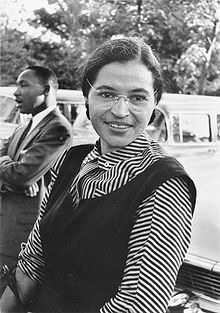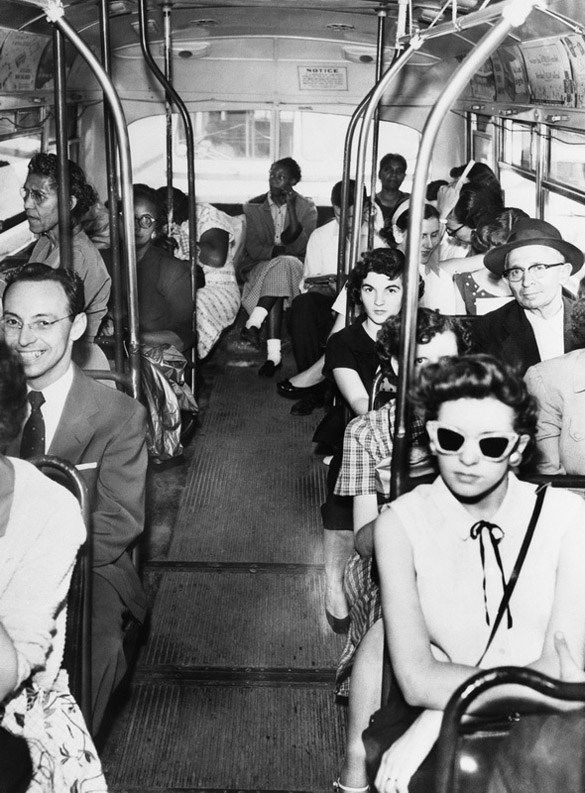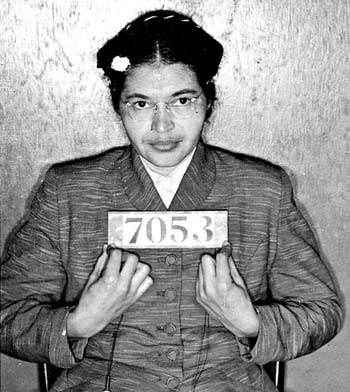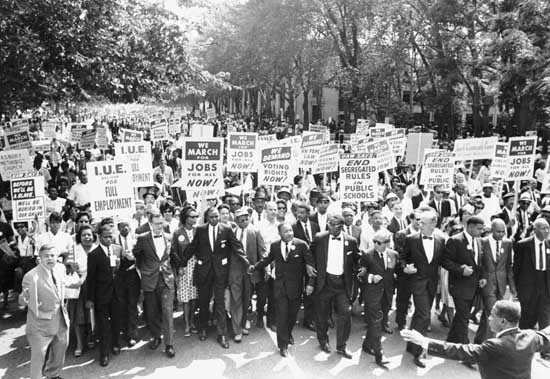 |
| Rosa Parks, 1955 (http://upload.wikimedia.org/wikipedia/commons/thumb/c/c4/Rosaparks.jpg/220px-Rosaparks.jpg ()) |
Buses have seats so you can sit, so who would want to stand? For African Americans, they were forced to give up their seats to white passengers and stand instead. Well, on December 1, 1955, Rosa Parks refused to give up her seat to a white passenger. This act advanced the Civil Rights Movement significantly. Rosa Parks is a hero because of her courage, perseverance, and her fight for others' freedom.
 |
| Segregated bus (http://4.bp.blogspot.com/-QK_FY_d4H6g/Tx44i0SuPLI/AAAAAAAADGE/5K_Mo7UDG2Y/s1600/Segregated_Bus+_black_and_white_photography.jpg () ()) |
Rosa Parks was born Rosa McCauley, on February 4, 1913, in Tuskegee, Alabama. As a young girl, she lived with her mom, brother, and grandparents in Pine Level, Alabama. Rosa attended the Montgomery Industry School for girls and graduated from the All-Black Booker T. Washington High School in 1928. Growing up, she had to deal with racism, and acts of hate toward her race. Also, there were laws that segregated bus seats by race; African Americans had to sit in the back rows and white passengers sat in the front of the bus. Over time, when there weren't any "white's only" seats available, bus drivers forced African Americans to give up their seats to white passengers.
In 1932, Rosa married Raymond Parks, a barber. Raymond convinced Rosa to join the National Association for the Advancement of Colored People in 1943. She also worked with the Montgomery Voters League to help increase African American voter registration. In 1955, Rosa Parks was accepted into a workshop for community leaders on school integration at the Highlander Folk School in Tennessee. "It was an important experience for Parks. She learned the practical skills of organizing and mobilizing and experienced harmony among blacks and whites that motivated her activism for years to come" (Benson). Rosa Parks was a very humdrum church going lady. She had such great role modeling characteristics such as kind, caring, loving, and always did and wanted what was right.
 |
| Rosa Parks arrested (http://4.bp.blogspot.com/_kvMusHIGFII/TVHk3kT-0DI/AAAAAAAAAU4/soNb1CGoFjA/s1600/Rosa-Parks-Dickson1dec05%255B1%255D.jpg ()) |
But, Rosa Parks' courage is what started it all. She wasn't afraid of future consequences, she just wanted what was right and would not stand for what was wrong. "She got on a bus on December 1, 1955. She did not intend to get arrested..." (Lerner). When she was asked to give up her seat to a white passenger, she refused because she was tired of giving in to what was said to be right, it wasn't a matter of being physically tired. She didn't care if it meant getting arrested. She just wanted what was fair and if being arrested was the price she was fine with it. Rosa also overcame fear with her great courage, "I remember going to sleep as a girl hearing the Klan ride at night and hearing a lynching and being afraid the house would burn down'" (American Academy of Achievement). Rosa also didn't fear, fear. The Ku Klux Klan was definitely something for her to be afraid of. But she didn't fear death, she just wanted equality. Rosa Parks' courage was far beyond standard, it was superior.
 |
| Civil Rights March (http://www.takingbackourfamily.com/images/photos/news/civil-rights-march.jpg ()) |
Racial segregation didn't just end in a few weeks, it took decades for laws to be passed, and unfortunately racism is still around. But, Rosa Parks' perseverance greatly advanced racial desegregation. "African Americans were repeatedly told by the bus company, the city council, and local community activists that the rudeness of the bus drivers was a fact of life in Montgomery. Nothing could be done to stop it" (Lerner). Being told by every single one of those people that that's just the way it is and you can't do anything about it would definitely kill a person's spirit and make them want to give up without trying. But, for Rosa Parks she didn't care that they wouldn't listen to her, that what she was doing wasn't changing those peoples' minds. She just cared about knowing that she was trying and she was trying her hardest when the battle seemed lost. She did all she could, "'I worked on numerous cases with the NAACP,' Mrs. Parks recalled, 'but we did not get the publicity. We didn't seem to have too many successes" (American Academy of Achievement). She was working on cases of murders and rapes. Even though they had no chance of winning, Mrs. Parks just wanted people to know that they were done being treated poorly and that they were going to fight and continue fighting. After her Bus incident, NAACP officials and Montgomery Church leaders decided to join Mrs. Parks and take action. They got their fellow African Americans to join in on a boycott of the buses. They made up about 70% of the bus company's business. The boycott lasted for months. It led to the Supreme Court ruling segregation of city buses unconstitutional. All of Rosa Parks' hard work and perseverance finally paid off.
For Rosa Parks it wasn't just about seeing the buses desegregated, it was about seeing her people being treated equally. It wasn't about how much she accomplished for her it was the big picture, "It pains me that there is still a lot of Klan activity and racism. I think when you say you're happy, you have everything that you need and everything that you want, and nothing more to wish for" (American Academy of Achievement). She was happy to see her accomplishments but it wasn't enough to satisfy her because it wasn't about her. It was about all of her people. She couldn't be happy until African Americans were truly treated equally and until they were seen equally. "It was more a matter of trying to challenge the powers that be, and to let it be known that we did not wish to continue being second-class citizens'" (American Academy of Achievement). The entire time it was about her people and the way they were being treated. Even though they had won the battle of the buses, she was still displeased about the way others would treat them. No law can change the way people think, but she didn't want people to think of her poorly.
Rosa Parks' courage, perseverance, and how she fought for others makes her a hero. Even though she died in 2005, she still shows everyone that if they want to see change that they have to be that change and to never give up. Even if standing up for what you believe in means sitting.
Works Consulted
American Academy of Achievement. "Rosa Parks Biography." Rosa Parks. American Academy
of Achievement, 9 Apr. 2012. Web. 09 May 2012.
"Montgomery Bus Boycott." U*X*L Encyclopedia of U.S. History. Sonia Benson, Daniel E.
Brannen, Jr., and Rebecca Valentine. Ed. Lawrence W. Baker and Sarah Hermsen. Vol. 5. Detroit: UXL, 2009. 1023-1026. Gale Virtual Reference Library. Web. 9 May 2012.
"Parks, Rosa." U*X*L Encyclopedia of U.S. History. Sonia Benson, Daniel E. Brannen, Jr., and
Rebecca Valentine. Ed. Lawrence W. Baker and Sarah Hermsen. Vol. 6. Detroit: UXL, 2009. 1200-1202. Gale Virtual Reference Library. Web. 8 May 2012.
"Rosa Parks Is Fingerprinted by Police." Human and Civil Rights: Essential Primary Sources.
Ed. Adrienne Wilmoth Lerner, Brenda Wilmoth Lerner, and K. Lee Lerner. Detroit: Gale, 2006. 330-333. Gale Virtual Reference Library. Web. 9 May 2012.
Page created on 7/1/2012 4:01:35 PM
Last edited 7/1/2012 4:01:35 PM
